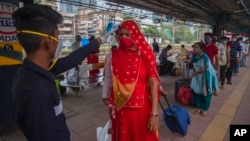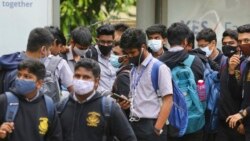India has announced precautionary measures to further mitigate the spread of COVID-19 amid the emergence of the omicron variant of the coronavirus, which has now appeared in nearly 25 countries, including the United States.
While India has not yet reported any cases of the new variant, the country said it was not weakening its fight against COVID-19, the disease caused by the coronavirus.
The Ministry of Health issued new guidelines, which took effect Wednesday, for international travelers. Ahead of arrival in India, they will have to upload a record of their travel history from the past 14 days to an online portal. They will also have to upload proof of a negative RT-PCR test, which would be taken 72 hours before their journey.
Passengers arriving from countries designated as “at risk” by the ministry, which include all European countries, South Africa, Brazil and China, among others, will have to take another COVID-19 test and wait for results before leaving the airport or boarding a connecting flight.
Passengers who test positive will have to quarantine for seven days and retest on the eighth day after arrival.
Six test positive
Following the instatement of these guidelines, six passengers, out of nearly 3,500 on 11 international flights from “at risk” countries, tested positive for COVID-19, according to a press release from the Health Ministry.
It is not clear when scheduled commercial international flights will resume. According to a notice released by the directorate general of civil aviation in response to the omicron variant, these flights will restart in “due course.”
Increased testing is also a priority across the country. On Tuesday, the Health Ministry directed states to conduct more COVID-19 testing, after testing decreased the prior week, according to the Reuters news agency.
Tests per day
Around 1 million tests have been conducted each day across the country in the past few weeks, but Reuters reported that this was less than half the testing capacity.
The Health Ministry warned state governments that this decline in testing would be problematic for the country’s fight against the pandemic.
In a letter to the northeastern state of Nagaland, which decreased testing by over a third in two months, Health Secretary Rajesh Bhushan wrote that decreased testing would make it “very difficult to determine the true level of infection spread in a geography,” according to Reuters.
"With a majority of countries seeing multiple surges in COVID cases in recent times and a few developed countries facing even fourth and fifth waves despite high levels of COVID vaccination, there is a need for continued vigil given the unpredictable and contagious nature of the disease," Bhushan wrote.
Some cities have also postponed the opening of schools to mitigate the virus’s spread. Reuters reported that the Mumbai municipal corporation announced it was delaying schools’ reopening for younger children until December 15. The city of Pune is also holding off students’ return to school.
Active cases decline
Currently, there are 99,023 active cases of COVID-19 in India, a decrease of 1,520 from Tuesday, according to data from the Health Ministry. Deaths, however, increased by 267, bringing the death toll to 469,247.
More than 1.2 billion vaccines have been distributed across the country.
The situation in India has improved dramatically since April and May, when the delta variant of the coronavirus ripped through the country, creating a massive second wave of the virus’s spread.
At the height of the delta variant’s spread, more than 400,000 new cases were being reported daily. The situation severely strained the country’s health systems, and the deaths of loved ones became a part of everyday life.
India’s new daily case average has since fallen, to 8,716 new infections, according to Reuters. This average is just 2% of the highest daily average that was reported on May 8.
Despite the improvement, India’s total infections rose to 34.6 million on Tuesday.





